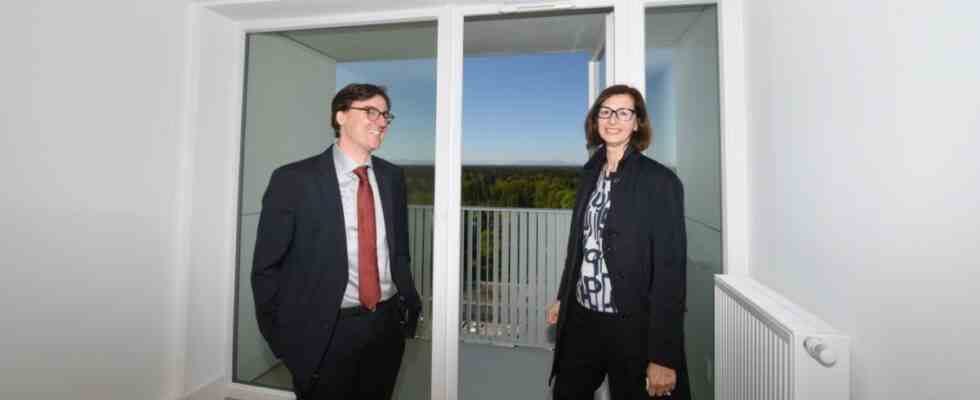The familiar picture is deceptive: in an official photo on the GWG website, they are sitting on a log, knee to knee, beaming as they compete. But Gerda Peter and Christian Amlong, the managing directors of the municipal housing association GWG, probably only have one thing in common: they both have to leave early. According to information from the SZ, the supervisory board has decided to part with the managing director. Disputes, poor communication, no enthusiasm for the planned merger of the two municipal companies GWG and Gewofag: a lot of resentment has built up in the town hall.
Even if talks are still going on about the formalities and the official language rules, there was an urgent political desire for change. In addition, Amlong is said to have said of his own accord that he cannot go on like this. The conditions at the top are said to have become untenable: It is an open secret that Peter and Amlong are so at odds that a reasonable conversation between the two is apparently no longer possible. “Spider enemy” is how the town hall describes the relationship. The wire to the workforce is said to have cooled off in a similar way.
This means that around 70,000 people in Munich will have a new chief landlord – or possibly two again. The GWG owns around 30,000 apartments in the city. The change at the top will not change the low rents: last year, tenants paid an average of less than eight euros per square meter.
Peter and Amlong were hired as managing directors in 2016 and started the service together. But they did not meet the expectations of politicians – or at least not anymore. The personnel Amlong shows how great the displeasure in the city council coalition must be. This had changed as a prominent SPD city councilor to the head of the GWG. The fact that a party member of one of the two government factions is dismissed prematurely is a highly unusual occurrence.
The restart that is now being forced comes at a time when the course is to be set anew at the housing associations GWG and Gewofag. In December 2020, the green-red coalition publicly announced for the first time that it wanted to bring the two municipal subsidiaries together. With 37,000 apartments, Gewofag, GWG’s big sister, has another 7,000 more in its portfolio. This could result in a multi-billion dollar company with around 1,000 employees.
The SPD has “set the two companies against each other”, criticizes the FDP
According to reports, the coalition was annoyed that the GWG, as a smaller company, did not show much desire and commitment to advance the merger. The two managing directors are also held responsible for this. You can see two different speeds at Gewofag and GWG, SPD parliamentary group leader Christian Müller publicly complained in December 2021 at a city council debate. The Greens and SPD originally wanted the merger to be completed by 2024, but progress is slow. The official status is largely that of the December 2021 meeting: At that time, the city council approved five million euros for external advice until 2025.
The coalition hopes that one strong company will give it more clout in the urgently needed construction of new homes. The two companies should build a total of 1,250 per year. Although they narrowly missed that number in 2021, the future goal is 2,000 per year. According to politicians, this can only be achieved with efficient structures. And not with the previous way of working of the GWG, where tenants are said to have stood in front of an unfinished house. In addition, the coalition sees potential in the areas of construction costs and digitization in the event of a merger.
Who should now accelerate the merger at GWG remained open at first, at least to the outside world. The question of whether the company will initially be run on an interim basis or with one or two managing directors should still be open. In Klaus-Michael Dengler, who has been in office since 2004, Gewofag has an experienced manager at its disposal. As of this year, Doris Zoller forms a dual leadership with him.
The opposition repeatedly criticized the way the two companies were treated. The fusion is aimed at without sufficient knowledge of the costs and benefits and is also set up completely wrong, according to the tenor of the CSU, FDP and Left Party. First, the sense of a merger must be examined and then acted, they demanded in several city council meetings. Comments about the different speeds in the preparations would “rush the two companies together,” said FDP parliamentary group leader Jörg Hoffmann.

